 Kia Optima: Installation
Kia Optima: Installation
| ŌĆó |
Thoroughly clean all
parts to be assembled. |
| ŌĆó |
Always use a new head
and manifold gasket. |
| ŌĆó |
The cylinder head gasket
is a metal gasket. Take care not to bend it. |
| ŌĆó |
Rotate the crankshaft,
set the No.1 piston at TDC. |
|
| 1. |
Install the OCV (Oil control
valve) filter.
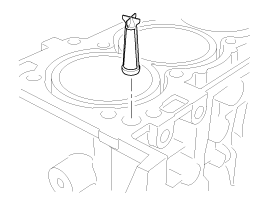
|
Keep the OCV filter clean. |
|
| 2. |
Install the cylinder head gasket
(A) on the cylinder block.
| ŌĆó
|
Be careful of
the installation direction. |
| ŌĆó
|
Apply liquid
gasket (Loctite 5900H or equivalent) on the edge of cylinder
head gasket upside and downside. (At the position 'B')
|
| ŌĆó
|
After applying
sealant, assemble the cylinder head in five minutes. |
|
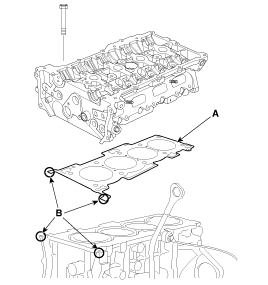
|
| 3. |
Place the cylinder head carefully
in order not to damage the gasket with the bottom part of the end. |
| 4. |
Install cylinder head bolts.
| (1) |
Do not apply engine oil
on the the cylinder head bolts. |
| (2) |
Using the SST(09221-4A000),
tighten the cylinder head bolts and plate washers, in several passes,
in the sequence shown. |
Tightening torque :32.4~36.3Nm
(3.3~3.7kgf.m, 23.9~26.8lb-ft) + 90~95┬░ + 90~95┬░
|
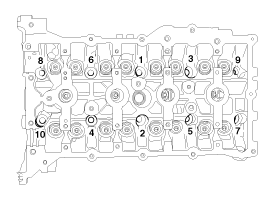
|
Always use new cylinder head bolt. |
|
| 5. |
Install the injector & rail module
(A). (Refer to FL group) Pre-tighten the bolts and then tighten the bolts
with the specified torque in the sequence shown.
Tightening torque :18.6~
23.5N.m (1.9 ~ 2.4kgf.m, 13.7 ~ 17.4lb-ft)
|
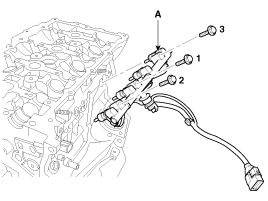
|
| 6. |
Install the intake CMPS (Camshaft
position sensor) (A).
Tightening torque :9.8
~ 11.8N.m (1.0 ~ 1.2kgf.m, 7.2 ~ 8.7lb-ft)
|
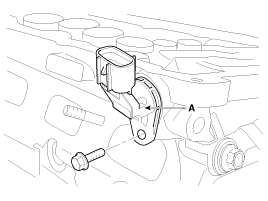
|
| 7. |
Install the exhaust CMPS (Camshaft
position sensor) (A) and the engine hanger (B).
Tightening torque :Sensor
bolt : 9.8 ~ 11.8N.m (1.0 ~ 1.2kgf.m, 7.2 ~ 8.7lb-ft)
Hanger bolt : 27.5 ~ 31.4N.m (2.8 ~ 3.2kgf.m, 20.3 ~ 23.1lb-ft)
|
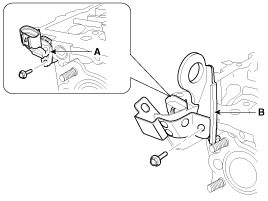
|
| 8. |
Install the intake OCV (Oil control
valve) (A) and the OTS (Oil temperature sensor) (B).
Tightening torque :OCV
bolt : 9.8 ~ 11.8N.m (1.0 ~ 1.2kgf.m, 7.2 ~ 8.7lb-ft)
OTS : 19.6 ~ 23.5N.m (2.0 ~ 2.4kgf.m, 14.5 ~ 17.4lb-ft)
|
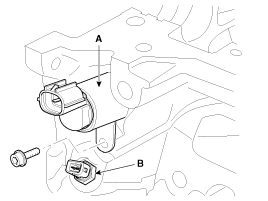
|
| 9. |
Install the exhaust OCV (Oil
control valve) (A).
Tightening torque :9.8
~ 11.8N.m (1.0 ~ 1.2kgf.m, 7.2 ~ 8.7lb-ft)
|

| ŌĆó
|
Do not reuse
the OCV when dropped. |
| ŌĆó
|
Keep the OCV
filter clean. |
| ŌĆó
|
Do not hold the
OCV sleeve (A) during servicing. |
| ŌĆó
|
When the OCV
is installed on the engine, do not move the engine with
holding the OCV yoke. |
|
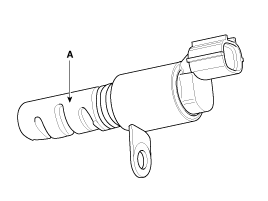
|
| 10. |
Install the camshafts.
|
Apply a light coat of engine oil on camshaft journals. |
| (1) |
Install the exhaust camshaft
lower bearing (A).
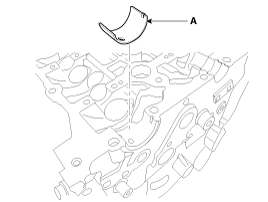
|
| (2) |
Install the camshafts
(A).
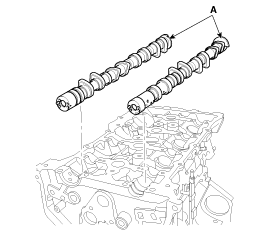
|
| (3) |
Install the exhaust camshaft
upper bearing (A) to the front bearing cap.
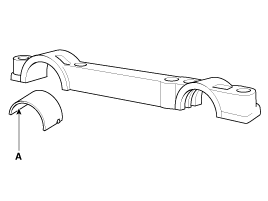
|
| (4) |
Install camshaft bearing
caps (A) in their proper locations. Tightening order
Group A → Group B → Group C.
Tightening torque
:Step 1
M6 : 5.9N.m (0.6kgf.m, 4.3lb-ft)M8 : 14.7N.m (1.5kgf.m,
10.8lb-ft)
Step 2M6 : 10.8 ~ 12.7N.m (1.1 ~ 1.3kgf.m, 8.0 ~ 9.4lb-ft)
M8 : 27.5 ~ 31.4N.m (2.8 ~ 3.2kgf.m, 20.3 ~ 23.1lb-ft)
|
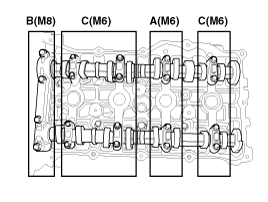
|
|
| 11. |
Install the intake CVVT assembly
(A) and exhaust CVVT assembly (B).
Tightening torque :53.9
~ 63.7N.m (5.5 ~ 6.5kgf.m, 39.7 ~ 47.0lb-ft)
|
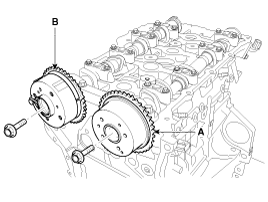
|
When installing the CVVT assembly bolt, prevent the camshaft from
rotating by using a wrench at position A. |
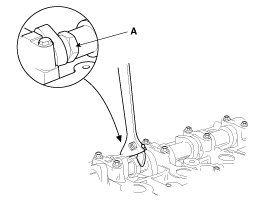
|
| 12. |
Install the high pressure fuel
pump bracket (A).
Tightening torque :18.6
~ 23.5N.m(1.9 ~ 2.4kgf.m, 13.7 ~ 17.4lb-ft)
|
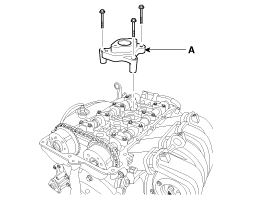
|
| 13. |
Install the intake and exhaust
manifold. (Refer to Intake and exhaust system in this group) |
| 14. |
Install the timing chain. (Refer
to Timing system in this group) |
| 15. |
Check and adjust the valve clearance.
(Refer to General information in this group) |
| 16. |
Install the water temperature
control assembly (A) with the water inlet pipe (B).
Tightening torque :Bolts
: 14.7 ~ 19.6N.m (1.5 ~ 2.0kgf.m, 10.8 ~ 14.5lb-ft)
Nut : 18.6 ~ 23.5N.m (1.9 ~ 2.4kgf.m, 13.7 ~ 17.4lb-ft)
|
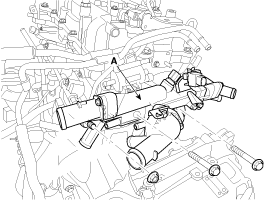
Tightening torque :9.8
~ 11.8N.m (1.0 ~ 1.2kgf.m, 7.2 ~ 8.7lb-ft)
|
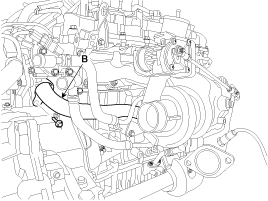
| ŌĆó
|
Assemble water
temp control assembly and water inlet pipe to water pump
assembly before nuts for assembling of water inlet pipe
to be tightened. |
| ŌĆó
|
Insert after
wetting O-ring or inner surface of thermostat housing.
|
| ŌĆó
|
Always use a
new O-ring. |
|
|
| 17. |
Install cylinder head cover.
| (1) |
The hardening sealant
located on the upper area between timing chain cover and cylinder
head should be removed before assembling cylinder head cover.
|
| (2) |
After applying sealant
(Loctite 5900H or equivalent), it should be assembled within 5 minutes.
Bead width : 2.5mm
(0.10in.)
|
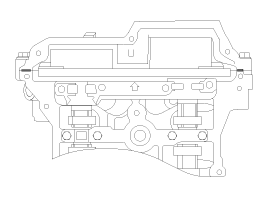
|
| (3) |
Install the cylinder
head cover (A) by tightening the bolts as following method.
Tightening torque
:1st step : 3.9 ~ 5.9N.m(0.4 ~ 0.6kgf.m, 2.9 ~ 4.3lb-ft)
2nd step : 7.8 ~ 9.8N.m(0.8 ~ 1.0kgf.m, 5.8 ~ 7.2lb-ft)
|
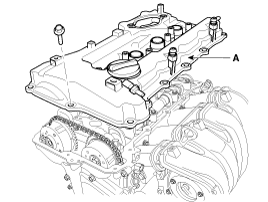
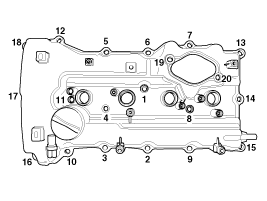
|
ŌĆó |
Do not
reuse cylinder head cover gasket. |
|
ŌĆó |
The firing
and/or blow out test should not be performed within
30 minutes after the cylinder head cover was assembled. |
|
|
|
| 18. |
Connect the throttle body coolant
hoses (A) and the oil cooler coolant hoses (A).
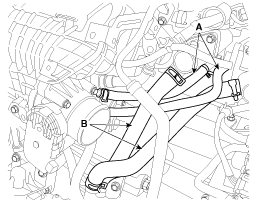
|
| 19. |
Connect the heater hoses (A).
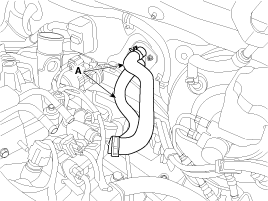
|
| 20. |
Install the high pressure fuel
pump (A) and the roller tappet (B). (Refer to FL group)
Tightening torque :12.7
~ 14.7N.m (1.3 ~ 1.5kgf.m, 9.4 ~ 10.8lb-ft)
|
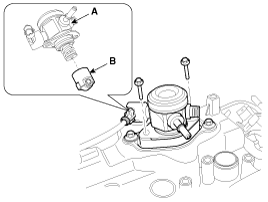
|
Before installing the high pressure fuel pump, position the roller
tappet in the lowest position (BDC) by rotating the crankshaft.
Otherwise the installation bolts may be broken because of tension
of the pump spring. |
|
Do not use already used bolt again. |
|
When tightening the installation bolts of the high pressure fuel
pump, tighten in turn the bolts in small step (0.5 turns) after
tightening them with hand-screwed torque. |
|
Note that internal damage may occur when the component is dropped.
In this case, use it after inspecting. |
|
Apply engine oil to the O-ring (A) of the high pressure fuel pump,
the roller tappet (B), and the protrusion (C). Also apply engine
oil to the groove where the protrusion is installed. |
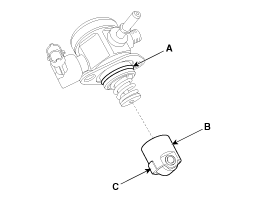
|
| 21. |
Install the high pressure pipe
(A). (Refer to FL group)
Tightening torque :Bolt
: 7.8 ~ 11.8N.m (0.8 ~ 1.2kgf.m, 5.8 ~ 8.7lb-ft)
Nuts : 26.5 ~ 32.4N.m (2.7 ~ 3.3kgf.m, 19.5 ~ 23.9lb-ft)
|
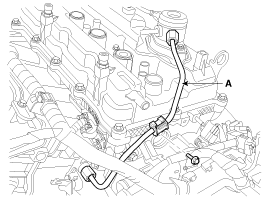
|
Do not reuse the high pressure pipe. |
|
| 22. |
Install the vacuum pipe assembly
(A).
Tightening torque :Bolt
& nut : 7.8 ~ 9.8N.m (0.8 ~ 1.0kgf.m, 5.8 ~ 7.2lb-ft)
|
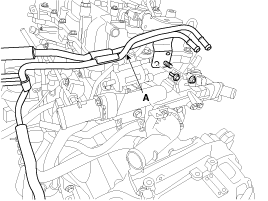
|
| 23. |
Connect the fuel hose (A) and
PCSV (Purge control solenoid valve) hose (B).
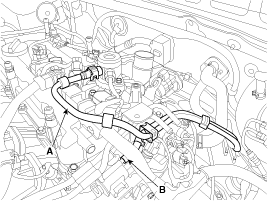
|
| 24. |
Connect the wiring connectors
and harness clamps, and install the wiring protectors to the cylinder head,
intake manifold and exhaust manifold.
| (1) |
Connect the exhaust OCV
(Oil control valve) connector (A) and the oxygen sensor connector
(B).
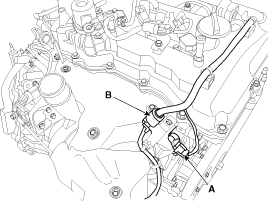
|
| (2) |
Connect the A/C compressor
switch connector (A), the alternator connector (B), the OPS (Oil
pressure switch) connector & injector extension connector (C), the
knock sensor connector (D), the MAPS (Manifold absolute pressure
sensor) & IATS (Intake air temperature sensor) connector (E), the
ETC (Electronic throttle control) connector (F) and the vacuum pump
connector (G).
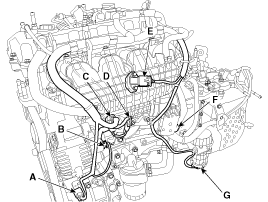
|
| (3) |
Connect the PCV hose
(A), the intake OCV (Oil control valve) connector (B) and the OTS
(Oil temperature sensor) connector (C).
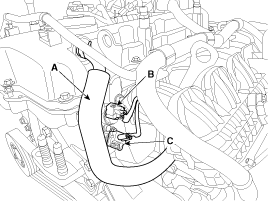
|
| (4) |
Connect the ignition
coil connectors (A), the fuel pump connector (B).
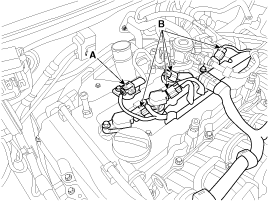
|
| (5) |
Connect the ECTS (Engine
coolant temperature sensor) connector (A), the condenser connector
(B), the CKPS (Crankshaft position sensor) connector (C), the exhaust
CMPS (Camshaft position sensor) connector (D) and the electric wastegate
actuator connector (E).
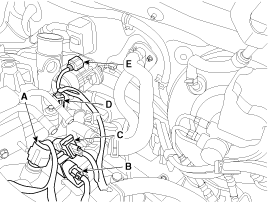
|
| (6) |
Connect the intake CMPS
(Camshaft position sensor) connector (A) and the PCSV (Purge control
solenoid valve) connector (B).
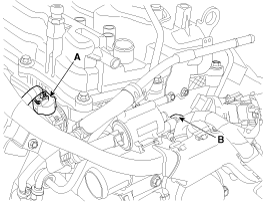
|
|
| 25. |
Connect the radiator upper hose
(A) and lower hose (B).
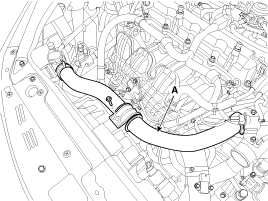
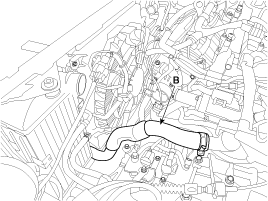
|
| 26. |
Install the under covers. |
| 27. |
Remove the RH front wheel. |
| 28. |
Install the intercooler inlet/outlet
hoses and the air cleaner assembly. (Refer to Engine and transaxle assembly
in this group) |
| 29. |
Install the air duct (B).
|
| 30. |
Connect the battery negative
terminal (A).
Tightening torque:4.0 ~
6.0N.m (0.4 ~ 0.6kgf.m, 3.0 ~ 4.4lb-ft)
|
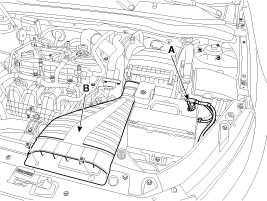
|
| 31. |
Install the engine cover. Perform
the following :
| B. |
Refill engine with engine
oil. |
| C. |
Refill a transaxle with
fluid. |
| D. |
Refill a radiator and
a reservoir tank with engine coolant. |
| E. |
Clean battery posts and
cable terminals and assemble. |
| F. |
Inspect for fuel leakage.
|
| - |
After assemble the fuel
line, turn on the ignition switch (do not operate the starter) so
that the fuel pump runs for approximately two seconds and fuel line
pressurizes. |
| - |
Repeat this operation
two or three times, then check for fuel leakage at any point in
the fuel line. |
| G. |
Bleed air from the cooling
system. |
| - |
Start engine and let
it run until it warms up. (until the radiator fan operates 3 or
4 times.) |
| - |
Turn Off the engine.
Check the level in the radiator, add coolant if needed. This will
allow trapped air to be removed from the cooling system. |
| - |
Put radiator cap on tightly,
then run the engine again and check for leaks. |
|
Thoroughly clean all parts to be assembled.Before installing the parts,
apply fresh engine oil to all sliding and rotating surfaces.
...
 Kia Optima: Installation
Kia Optima: Installation Reassembly
Reassembly Cylinder Block
Cylinder Block




































